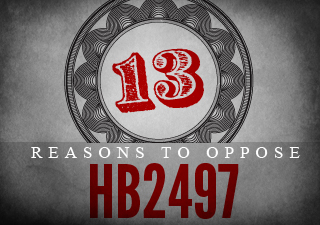Fact Sheet

13 Reasons to Oppose HB 2497
Pennsylvania’s largest public pension plans—Public School Employees Retirement System (PSERS) and State Employees Retirement System (SERS)—are severely underfunded. But instead of reforming the defined-benefit pension system and paying down these liabilities, House Bill 2497 would defer pension payments and increase the unfunded liability by tens of billions of dollars in lost investments and interest. Simply put, HB 2497 is generational theft-forcing our children and grandchildren to pay for Harrisburg’s fiscal irresponsibility.
To the Point on HB 2497
- It steals from our kids and grandkids.
- It is unconstitutional.
- It “saves” money like not paying this month’s credit card bill “saves” money.
- It thwarts real reform of our unaffordable and unsustainable public pension systems.
13 Reasons to Oppose HB2497
- HB 2497 is “generational theft”. Data provided by PSERS demonstrates how HB 2497 transfers taxpayer contributions to the next generation (increasing “generational theft”) and will cause PSERS and SERS to become seriously underfunded over the next 15 years. It is estimated PSERS will be only about 55% funded in 2018. Ironically, this is close to the 50% funding threshold at which the state will take control of the City of Pittsburgh’s pension plans on December 31, 2010. The unfunded liability in PSERS alone is projected to exceed $40 billion in 2017 and remain at this level for at least 12 years under HB 2497.
- HB 2497 is unconstitutional. The Legislative Reference Bureau, the House Appropriations Chairman, and many others have noted the clear violations of the single-subject requirement of our Constitution.
- HB 2497 deceptively uses the word “savings”. “Savings” is used to describe (1) taxpayer contributions not made (which only increases funding deficits) and (2) estimated taxpayer contribution reductions associated with the modified benefit levels for new hires. Both of which are contingent on the faulty assumptions described in #7 below. “Savings”, as deceptively applied to HB 2497, is like not paying your credit card bill for three years and telling your spouse not to worry about the non-payments and compounding interest.
- HB 2497 is an unaffordable gift to public sector unions at the expense of current and future taxpayers. There is no financial imperative that this non-reform bill be adopted this month. The reason for this final push with a lame-duck Governor is the prospect of real pension reform in a new legislative session with a new governor.
- HB 2497 perpetuates overpromised and underfunded pension plans. Someone should ask, why don’t the vast majority of private sector employers utilize defined benefit pension plans anymore?
- HB 2497 repeats past pension “reform” mistakes. Act 40 of 2003 deferred then unaffordable contributions from 2003 to 2012. Once again, the near term contributions are deemed unaffordable and unsustainable. How does further deferring these contributions make future contributions more affordable and sustainable?
- HB 2497 relies on three faulty assumptions. HB 2497 projections are predicated on three unlikely assumptions: (1) Assets will earn 8% per year (while private sector forecasts are 6% and lower), (2) Politicians (using taxpayer money) will actually fund this newly created spike beginning in 2015 of more than 20% of payroll, which is sustained for 20 years thereafter, (3) There will be no benefit improvements in the foreseeable future (such as ad-hoc COLAs). Since it is unlikely any of these assumptions will be achieved, these projections are useful only for political purposes.
- HB 2497 puts future taxpayers at significant risk. The “innovative” new member cost sharing formula is poorly designed, contains loopholes, and is more political than practical. This will result in significant risks to future taxpayers.
- HB 2497 violates pension best practices. The proposed funding and plan design changes are completely inconsistent with the funding requirements and the best demonstrated practices in the private sector.
- HB 2497 fails to conform to generally accepted actuarial standards of practice. The Public Employee Retirement Commission’s actuarial note of October 12, 2010 indicates: “It must be noted that the temporary collared contribution rates proposed in the bill as amended do not follow generally accepted actuarial standards of practice” and “It is the professional opinion of the Commission’s consulting actuary that ten years is too long a time period over which to recognize investment gains and losses because such an extended smoothing period has the potential to produce actuarial values of assets that deviate greatly from market values of assets.”
- HB 2497 fails to comply with proposed new accounting standards. This funding approach will not be compliant with new proposed pension accounting standards being considered by the Government Accounting Standards Board (GASB). This will potentially adversely impact future bond ratings.
- HB 2497 will only create more disincentives for future taxpayers to live, work and invest in Pennsylvania.
- Our children and grandchildren deserve better. We should not pass our debts and bad policy decisions on to future generations.
# # #
For more on Pension Reform, visit PublicPensionReform.com